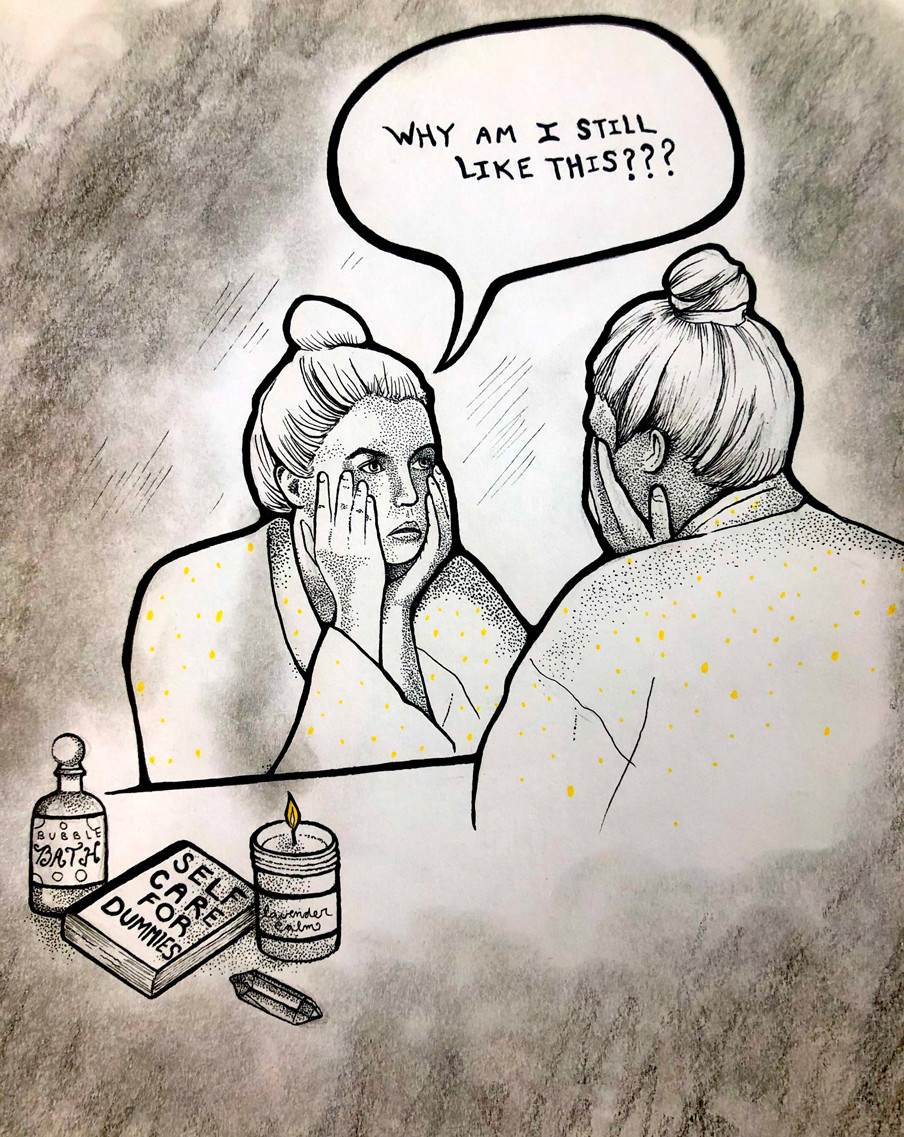The fault in our self-care
Life on the Borderline

Illustration by Gabrielle Funk
The cure for depression is not essential oils, a healthy gut or radical self-love.
The comparison between physical and mental illness is becoming tired, but it bears repeating. You wouldn’t tell someone with a severed limb to love themselves until it spontaneously reappeared or to surround themselves with blood crystals and stolen sage. We cannot purchase or “good vibe” our way out of mental illness when the world is collapsing around us.
For starters, our bodies don’t recognize capitalism as a sign of safety. Our bodies recognize basic, ancient physical cues that predate bubble baths and athleisure by a long margin. Physical activity (exercise or gentle movement), belly breaths, belly laughs and safe physical contact all signal to our body that a threat has passed.
The dopamine (feel-good chemical in our brains) rush when we purchase something is the same as the rush we get when we run, breathe deeply or get a long hug, which tricks us into a false sense of feeling better. The difference is that while physical safety cues also release longer-lasting feel-good chemicals, the dopamine-only rush from shopping ends when we receive the product, leaving us with less money and feeling as low as we did before.
This is where the self-care story turns rather cruel. As the costs of living skyrocket, women’s rights remain hotly contested, parts of the world literally catch fire, and society insists on placing the value of humans on a sliding, colour-coded scale, it’s not surprising that global happiness levels have been declining over the last few years. When people feel less happy, they are increasingly looking to health and wellness products to make themselves feel better.
But why is everyone suddenly convinced that health and wellness are key to happiness? Perhaps a better question would be: why do people suddenly think it’s their own fault that they are unhappy?
To answer this question, we need to look at our cultural heritage in Canada: white supremacy. It’s not just for neo-Nazis. After all, this country is built on the foundation of settler colonialism, on the backs of Indigenous peoples who are now dangerously marginalized by this same culture.
White-supremacy culture tells us that if we can’t afford to be well, we don’t deserve to be well. If we can’t afford to do yoga retreats, fad diets and cleanses, it’s our own fault that we are sick and sad. If our job doesn’t cover therapy or give us time off to go to appointments, we’re not trying hard enough to get better.
Never mind those of us who can’t afford shelter, food or basic personal-hygiene products. The myth of pulling ourselves up by our bootstraps is not only physically impossible, but wildly out of touch with the realities of living below the middle class.
We need accountability, not positive affirmations. Accessible healthcare, not organic food. Safe, affordable homes, not fitness regimes. Wellness “gurus” can sell us all the tips to playing the game they want, but we’ll never win when the game is hopelessly rigged against us from the start.
Hannah Magnusson is a master’s student in the arts department at Athabasca University. Her research focuses on the intersection of storytelling and advocacy, studying how fostering empathy between different perspectives can build a bridge to understanding and action. She lives on Treaty 1 territory on the shore of Lake Winnipeg.
Published in Volume 75, Number 17 of The Uniter (February 4, 2021)







